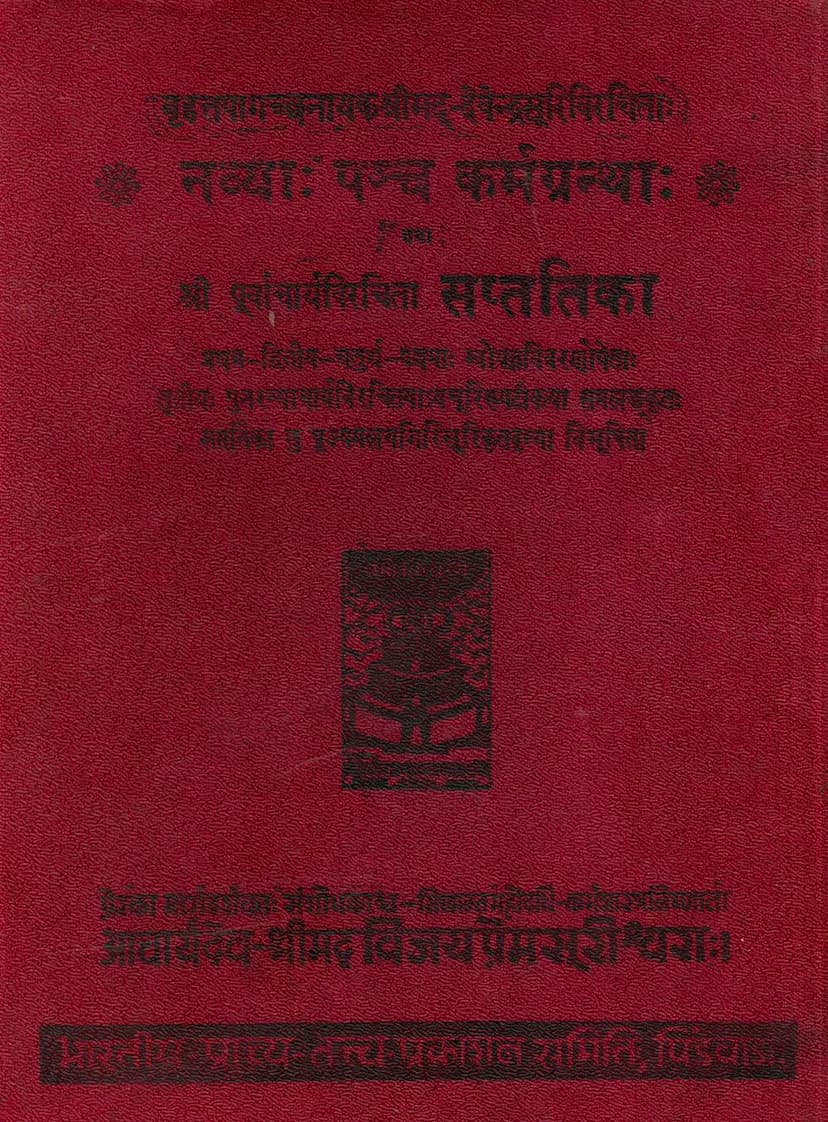Navya Panch Karmgrantha Tatha Saptatika
Added to library: September 2, 2025

Summary
This document is a comprehensive summary in English of the Jain text "Navya Panch Karmgrantha Tatha Saptatika" by Devendrasuri and Malaygiri, published by Bharatiya Prachya Tattva Prakashan Samiti. The provided text is the first part of a compilation, containing the "Naveya Panch Karmgrantha" (Five New Karmic Treatises) and "Saptatika" (a collection of seven).
Here's a breakdown of the key information and content:
Book Title: Navya Panch Karmgrantha Tatha Saptatika
Author(s): Devendrasuri (credited for the "Naveya Panch Karmgrantha"), Purvacharya (authors of "Saptatika"), Malaygiri (commentator on "Saptatika").
Publisher: Bharatiya Prachya Tattva Prakashan Samiti, Pindwada.
Content Summary:
The book is a compilation of significant Jain texts on the science of Karma. It specifically highlights:
-
Naveya Panch Karmgrantha (Five New Karmic Treatises): These were composed by Acharya Shri Devendra Suri, based on the works of earlier Acharyas. The five treatises are:
- Karma Vipaka (First): Details the classifications and manifestations of the eight types of karma (like Jnanavaraniya, Darshanavaraniya, Vedaniya, Mohaniya, Ayushya, Nama, Gotra, Antaraya), their binding causes, and their effects.
- Karma Stava (Second): Focuses on the praise of Lord Mahavir through the lens of karma, analyzing the bond, inflow, outflow, and persistence of karmic natures in the fourteen stages of spiritual development (Gunasthana).
- Bandha Samitva (Third): Discusses the principles of karma binding (Bandha Samitva) concerning the fourteen types of life-world classifications (Marga Sthana) and their sub-classifications.
- Shadashiti (Fourth): This treatise is structured around five divisions: Jiva Sthana, Marga Sthana, Guna Sthana, Bhava (mental states), and Sankhyata (enumeration/statistics). It offers detailed explanations of these concepts, particularly within the context of karma.
- Shataka (Fifth): This treatise, also known as the sixth Karmagrantha, was composed by earlier Acharyas and commented upon by Pujya Malaygiri Suri. It elaborates on the general and specific characteristics of karma bondage, inflow, and persistence across different spiritual stages, life forms, and classifications, making extensive use of "Saptapadarupanaya" (description of the seven principles) and "Swamityarupanaya" (principles of ownership/authorship).
-
Saptatika (The Sixth Karmagrantha): This work by an earlier Acharya is included, with a commentary (Vrutti) by the venerable Malaygiri Suri. The commentary is noted for its detailed analysis of the common and specific conjunctions of karma bondage, inflow, and persistence across spiritual stages, life forms, and classifications. It emphasizes the importance of understanding the "Saptapadarupa" (seven principles) and "Swamitva" (ownership) for a deeper comprehension of karma.
Key Themes and Importance:
- Centrality of Karma in Jain Philosophy: The text underscores the pivotal role of karma in Jainism, explaining that karma is the primary cause of the cycle of birth and death (Samsara) for living beings. Understanding its nature is crucial for liberation.
- Detailed Analysis of Karma: The works provide an exhaustive classification and analysis of karma, including:
- Prakriti (Nature): The types and sub-types of karma.
- Bandha (Bondage): The causes and mechanisms of karmic binding.
- Udaya (Inflow/Manifestation): How karma influences actions and experiences.
- Udirana (Outflow/Expulsion): The process of karma being released.
- Satta (Persistence): The state of karma being present but not yet manifest.
- Bandha Samitva (Principles of Binding): Exploring who binds what type of karma and when.
- Vipaka (Manifestation/Effect): The results of karma.
- Alpabahutva (Relative Quantity): Comparisons of the quantity of different karmic types under various conditions.
- Bhava (Mental States): The role of mental states in karma.
- Guna Sthana (Stages of Spiritual Evolution): How karma operates across the fourteen stages of spiritual progress.
- Marga Sthana (Life-World Classifications): How karma is influenced by different categories of existence.
- Commentaries and Scholarly Effort: The compilation highlights the presence of extensive commentaries (Vivruti, Teeka, Avachuri) by eminent scholars like Malaygiri Suri and the authors' own commentaries on their works, indicating a rich tradition of Jain scholarship in this domain.
- Dedication to Spiritual Knowledge: The preface and publisher's notes reveal a dedication to disseminating this profound knowledge for the spiritual benefit of the community, with the support of philanthropic individuals and organizations. The publication is seen as a means to attain liberation by understanding and overcoming karmic bondage.
Overall Significance:
The "Navya Panch Karmgrantha Tatha Saptatika" serves as a foundational text for understanding the intricate and comprehensive system of karma in Jainism. It preserves and disseminates the profound insights of ancient Jain thinkers on this crucial aspect of spiritual science, aimed at guiding practitioners towards liberation by dispelling ignorance and attachment to karmic substances.